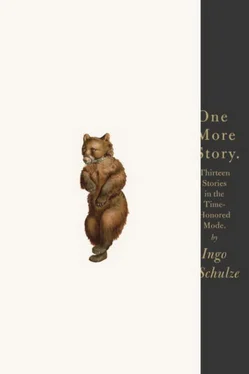A friend of his in Lahti, who also ran a museum and to whom he had sold two old German telescopes at a friendly discount, had passed on an inquiry about whether he, Arne, could perhaps act as an agent to locate a house at a good price along the coast. Although he had not agreed to this arrangement, suddenly there stood Mika, along with his wife, a stunning Argentinean, and their three children. Nothing came of the house deal, but Mika had been wildly enthusiastic about the local forest — which Arne found surprising, since Finland had plenty of forests of its own. It turned out that Mika was a hunter, and he called this forest a Russian forest and suggested that surely there were bears in a Russian forest. He, Arne, had never seen a bear in Lahemaa, but, since the house deal had fallen through, he didn’t want to dash Mika’s hopes a second time, and so had promised to inquire about bears at the local game and forestry office. There were plenty of bears, so he learned, but it was forbidden to shoot animals in the national park. Unless — here Arne raised his right hand and began to rub his thumb against his first two fingers — unless the bear presented a serious threat to the life and limb of locals and tourists.
Arne had come to an agreement with the game warden as to how many Finnish markaa it would cost Mika to obtain the ruling. Mika agreed to the sum, half in advance, the rest on the hide of the bear. In March a family of bears actually turned up in Lahemaa. But to avoid additional difficulties, the game warden had requested the hunt be postponed until autumn.
But the family of bears vanished in May, and there had been no trace of them since. The game warden had telephoned him a week ago and confessed that unfortunately he was no longer in a position to pay back the advance. In lieu of the cash, the game warden gave him a hot tip: A once highly renowned circus from Soviet days was eking out a livelihood in a St. Petersburg suburb. They were trying to unload their animals because their upkeep was too expensive. And so yesterday, for a payment of three hundred marks, Arne had taken charge of Seryosha, whom his caretaker had smuggled across the border through the forest. And so now they had a bear.
In response to Tanya’s question of whether he had informed Seryosha’s caretaker what fate awaited her charge, Arne brusquely asked in return whether she would prefer that Seryosha starve. Thanks to his good work, the animal would at least die with a full tummy and the pleasure of having enjoyed a couple of hours in the wild.
The plan was to let Seryosha settle in at the edge of this clearing for a day or two. To ease the pain of separation, his caretaker had also given Arne a pair of her old shoes and a jacket. Arne pulled out a well-worn moccasin, like the ones I had worn as a child, and got out of the van.
I smiled, unable to suppress my suspicion that what Arne had told us was your basic cock-and-bear story. “You don’t believe me?” he asked. I shrugged. “Tomorrow,” Arne said, “Mika will be here. Maybe you’ll want to apologize then.” I apologized on the spot, and several times over, but to no avail. Arne had opened the van’s rear door, and now clapped three times, called Seryosha’s name, and with the shoes and jacket bundled under his arm and a sack of food thrown over his shoulder, set out across the heather.
Tanya and I stood beside the van. As he trotted alongside Arne, Seryosha was a beautiful sight to behold. It was not just his loping gait, which made it look as if he were dragging his paws behind him. Under that mass of fur moved a body no less supple than a tiger’s, except that Seryosha’s elegance was less obvious.
When we finally lost sight of them in the trees at the far side of the clearing, Tanya asked what I would do if Arne were to scream for help. “Certainly not run in his direction,” I said.
On the drive back each of us was lost in our own thoughts. Our good-byes were brief. Arne had enough to do calming down his setters — and a clutch of teachers and their students.
Tanya took it upon herself to walk over to Arne’s that evening to ask him about the sauna, but either Arne wasn’t there or he didn’t want to be disturbed.
As we drank our tea in the winter garden, we tried without success to imagine the hunt. Would Arne clap his hands three times and call out “Seryosha”? Should we or shouldn’t we hope that Seryosha had made his getaway? Did a circus bear have any chance at all in Lahemaa? Wouldn’t he seek out the company of people, so that sooner or later he’d be shot as a dangerous animal? Seryosha’s future didn’t look rosy, and there was nothing we could do about that.
The next day was warm, the sky cloudless, and we made an excursion to Palmse, once the estate of a German baron. Afterward we visited a forest chapel, which was set in the middle of an old cemetery. (I’ve rechecked my notebook. In point of fact there is not a single entry about Estonia. Although Tanya did use two pages to record the names on the wooden crosses and gravestones. I now remember how ashamed I felt that it was she who jotted down those names and not me.)
On the drive home the weather turned gloomy, it began to rain. But once we arrived home our mood immediately turned more cheerful — smoke was rising from the sauna cabin. Arne had in fact heated it and filled the basins in the entryway with fresh birch branches.
As we entered the steam room, each of us dressed in no more than a towel over one arm, we found three men already huddled in the small room. They neither responded to our greeting nor moved closer together to make room for us. Instead they ogled Tanya. From the corner of my eye I could see the one seated behind her trace a female silhouette in the air. We couldn’t understand what they were saying, of course, but their stifled childish giggles didn’t need an interpreter. Tanya left the sauna after a few minutes and returned to the house.
I was idiotic enough to believe I ought not yield the battleground to the Finns without a fight, so I was the first to go back inside and stretch out on the upper bench, leaving them to crowd together on the lower one. In the course of the next half hour I thought I could observe the other two brownnosing the guy with a blond mustache and a back sprinkled with moles. They held the door open for him and closed it behind him, let him be the first under the shower, the first to select a seat — and everything he said was met with a twofold echo.
Returning to the Epos Room, I immediately noticed something was up. I looked at Tanya — and she was already in mid-explosion. Our arguments always follow the same pattern. They begin with my failure to notice or notice too late what should be the appropriate response. In this case, since I had chosen not to take on those three louts directly, I ought to have at least followed Tanya out. But I was a man who could never forgo his pleasures, and by my behavior I had, whether intentionally or not, sided with them.
It is truly remarkable. Although I earn my daily bread by observing and describing situations and emotions, compared with Tanya I see myself as utterly tone deaf and dull witted.
The situation escalated when shortly thereafter the guy with the blond mustache sat down at the dining-room table to disassemble and clean two guns. While he worked he loudly whistled random melodies. I had to do something.
My suggestion that he could in fact tend to his weapons in his room was ignored with a grin. When I insisted, he cried, “Arne! Arne!” as if Arne had assigned him to his task. But when I picked up the barrel of one of the guns, he shouted in English, “Don’t touch it! Don’t touch it!” and snatched it away from me. The upshot was that we spread our evening meal over one half of the table — the lyric poetess from the Novella Chamber was impervious to our request that she join us in defending the dining room. The other half was occupied by the Finn, who was still busy oiling his weapons. For a while he kept up his mindless whistling, but much to our gratification was the first to beat a retreat.
Читать дальше












